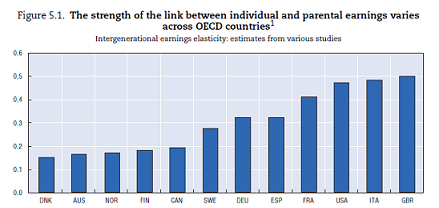Last month The Guardian reported the finding of an OECD study that the UK has the worst social mobility of the dozen OECD countries for which data was available.
In economics, the basic measure of social mobility is how much someone's income is determined by the income of their parents, after controlling for certain variables. That's certainly not a perfect measure - for example it misses changes in income within people's lives - but it's hard enough to measure as it is. The OECD report also looks at the education, and its relationships with income.

This graph shows how much the income of parents determines the income of their children. The higher the score, the less social mobility there is. In crude terms, the rich stay rich, the poor stay poor. Most people wouldn't need persuading this is a bad thing. The UK is alongside Italy and the US in the difficulty poor children face getting richer, and the ease with which rich children stay rich. (Technically speaking, because of the limited accuracy of the measurements, we probably can't assert any real distinction between them.)
There are a few things I'd like to know more about. First is the influence of intra-generational inequality. The report does talk about this, and I think finds that inequality reduces mobility, but I didn't read it closely enough to understand exactly how, or how they accounted for this. Second, what is the effect of immigration? Migrant status is factored in in some way, but there's no discussion of how it might affect the findings. It may be of note that countries like the US and France have relatively high levels of immigration, Austria and Norway low. Thirdly, how does the size and heterogeneity of the US affect its figures? Eg. do people in poor states stay where they are, rather than making the (comparatively) distant move to a richer state to earn more money?
Those provisos aside, what struck me about this report was the same as other international studies of social mobility I've seen. It's a conventional view that the US is a land where anyone can make it big, that it is full of rags to riches (and riches to rags) stories, and more socially fluid than Europe. The actual evidence suggests otherwise. If you're born into a poor family in the US you're more than twice as likely to stay poor than someone in Denmark, or Canada. If you're born into a rich family, you're more likely to stay rich.
I'd like to have some useful insights for the UK, but unfortunately I don't. The report finds certain educational policies, plus redistributive and income support policies to strongly enhance mobility. If you're interested, have a skim of it yourself.




No comments:
Post a Comment